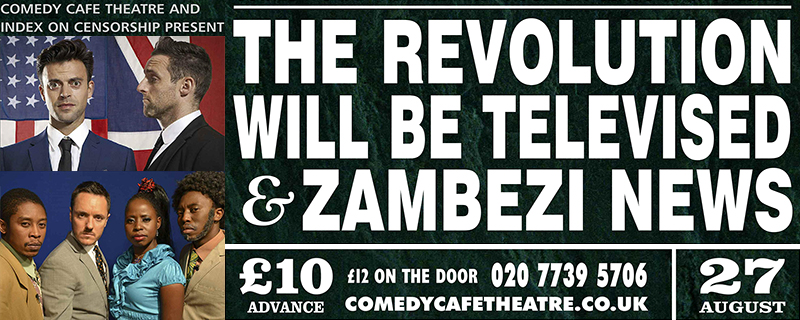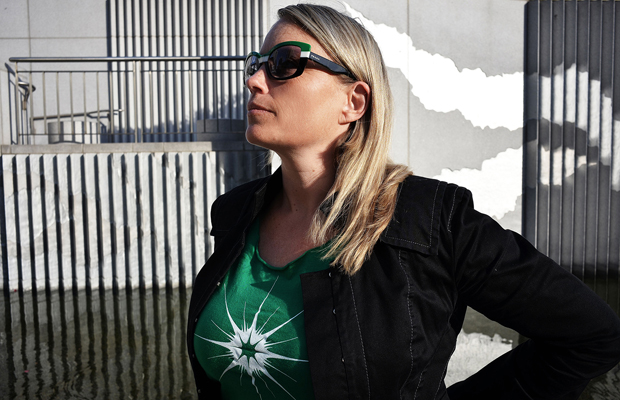Comfort zones are killing comedy
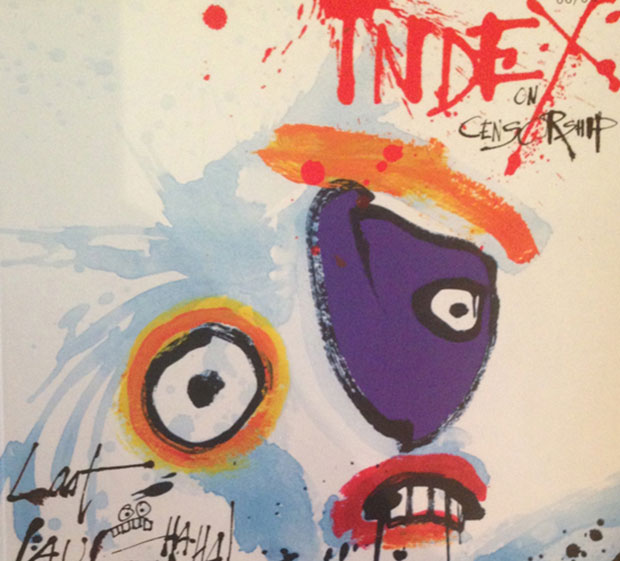
Whenever I’m trying to fill an hour of stand-up for the Edinburgh Festival, the last thing I wonder is, “Jeez, will this set land me a spot on television?” The reasons are twofold: first, I do what makes me laugh, otherwise I get bored; second, I’ve done stand-up on television and it ain’t the apex of my career. Television producers and editors seem to have an uncanny knack for siphoning the humour out of just about anything, especially the royals, and particularly the pretty, dead ones.
Yet television comedy is held in some oddly high regard as a move up for a comic. I guess that’s because if you can’t get a TV profile going, your live shows in the provinces don’t sell very well. Why should someone in, say, Leeds, come and see you at the Varieties if you aren’t good enough to be on Les Dawson?
But to be on Les, or any television programme, your set must be “clean”. Which means few or no dirty words. Misogyny within social norms, fine, but save the word “cunt” for the wife beatings, mate. That’s right. No “cunts”, although the halls of the BBC are teeming with them. Which is sad, since “cunt” is plainly the most versatile word in the English language. It’s a verb, a noun, an adjective, and it’s really the last word on earth that, no matter how it’s used, makes my mother angry. One is also discouraged from using the word “fuck” on television, particularly as a verb. Particularly if you’re gay.
See, as an out cocksucker, there are lots of things I can get away with on stage but, on television, I’m already perceived as dangerous. TV companies treat me, in rehearsal for a taping, as though I’m retarded or a child or, worse yet, American. “Please be nice, Mr Capurro. You want the people watching to like you, don’t you? Good. We wouldn’t want everyone to think that you’re naughty, would we?”
Then they go through the litany of words I’m not supposed to use. When the show is edited and televised, other comics’ “fucks” are left in. Mine are removed. After all, being gay is dirty enough. Do I have to be dirtier with my dirty mouth?
I’m not really complaining. I’ve learned to manoeuvre my way throughout television. I can play the spiky-but-warm, take-the-cock-out-of-my-mouth-and-press-the-tongueto-my-cheek game with squeamishly positive results. Usually. But in Australia, during the taping of a “Gala” to honour a comedy festival in Melbourne, the director had a grand-mal seizure when I described Jesus as a “queerwannabe”. I saw papers fly up over the heads of a stunned, strangely silent audience. Later I found out it was the director’s script. Apparently they found him after the show, huddled in a corner, crying like a recently incarcerated prisoner who’d just taken his first “shower”.
He was afraid I’d pollute minds, I suppose. At least that’s what he told his assistant. So now, TV is promoting itself as a politically correct barometer? A sort of big-eyed nanny looking out for our sensitive sensibilities? In the six years that I’ve been performing in the UK, I’ve seen political correctness catch on like an insidious disease, like a penchant for black, like the need to oppress. Comics use the term to describe their own acts during TV meetings, and everyone around the table nods in appreciation and approval. Or are they choking? I can never tell with TV people.
Maybe they’re suffocating under a pillow of their own stupidity, since no one really understands the meaning behind political correctness, the arch, high-browed stance it panders to. The phrase was coined as a reaction to racism in the US, to respond with a sort of kindness that had been stifled when hippies disappeared from the US landscape. PC took the place of sympathy which has, since Reaganomics, had a negative, sort of “girlie” tone to it that few US politicians, especially those who served in ‘Nam, can tolerate. Being politically correct makes the user feel more in control and smarter, because they can manipulate a conversation by knowing the proper term to describe, say, an American Indian.
‘They’re actually indigenous peoples now,’ a talk-show host in
San Francisco told me while on air recently. ‘The word Indian is
too marginal.’
‘But where are they indigenous to?’
‘Well, here of course.’
‘They’re from San Francisco?’
‘No. I mean, yes. My boss’ — we were discussing his producer, Sam —
‘was born and raised here, but his parents are Cherokee from Kansas. Or
was it his grandparents?’
‘My grandfather is Italian, from Italy. What does that make me?’
‘Good in bed.’
Indigenous, tribal, quasi or semi. All these words are used to describe, politely, “the truth”. But, strangely enough, the truth is camouflaged. The white user pretends to understand the strife of the minorities, their emotional ups and downs, their need for acceptance and understanding, when all the minorities require is fair pay. I’ve never met a struggling Costa Rican labourer who was concerned that he be called a “Latino” as opposed to a “Hispanic”. He just wants to feed his family. Actually, I’ve never met a struggling Costa Rican, period. But that’s because I’m one of the annoying middle class who keep a distance from anyone who’s not like them, but who also has the time and just enough of an education to make up words and worry about who gets called what.
To the targets, the people we’re trying to protect – the downtrodden, the homeless, the forgotten – we must appear naive and bored, like nuns. It’s a lesson in tolerance that’s become intolerant. As if to say: “If you don’t think this way, if you don’t think that a black person from Bristol is better off being called Anglo-African, you’re not only wrong, you’re evil!” It’s pure fascism, plain and simple. It’s as if Guardian readers had unleashed their consciousness on everybody else, and so it’s naughty to make jokes about blacks, unless you’re black, and bad to make fun of fat people, if you’re not fat, etc. Suddenly, everyone is tiptoeing around everyone else, frightened they’ll be labelled racist because they use the word “Jew” in a punchline. Or horrified someone will think them misogynist because they think women deal better with stress.
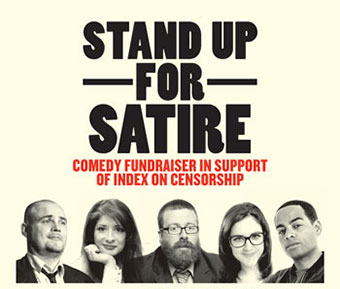 Index on Censorship has been publishing articles on satire by writers across the globe throughout its 43-year history. Ahead of our event, Stand Up for Satire, we published a series of archival posts from the magazine on satire and its connection with freedom of expression.
Index on Censorship has been publishing articles on satire by writers across the globe throughout its 43-year history. Ahead of our event, Stand Up for Satire, we published a series of archival posts from the magazine on satire and its connection with freedom of expression.
14 July: The power of satirical comedy in Zimbabwe by Samm Farai Monro | 17 July: How to Win Friends and Influence an Election by Rowan Atkinson | 21 July: Comfort Zones by Scott Capurro | 24 July: They shoot comedians by Jamie Garzon | 28 July: Comedy is everywhere by Milan Kundera | Student reading lists: Comedy and censorship
Somehow we’ve forgotten that it’s all in how you say it. To read a brilliant stand-up comic’s act is pedantic, but to see it performed is breathtaking. That’s because what we say might be clever, but the way we arrange and self-analyse and present is where the fun comes in. Same with all those words we use. They’re not “racist” or “dangerous” by definition.
Speaking of definitions, let’s talk about the word “gay”. Lots of people I meet are concerned about what I should be called. Is it gay, which pleases the press, or queer, which pleases the hetero hip, since they think gays are trying to reclaim that word? The fact is that all those words are straight-created straight identifiers. Gay is a heterosexual concept. It’s a man who looks like a model, dresses like a model and has the brain of a model. He has disposable income, he loves to travel, and he adores – thinks he sometimes is – Madonna. He’s a teenage girl really and straights love objectifying him the -way they do teenage girls. Or the way they do infants. Try watching a diaper commercial with the sound off. It’s like porn. You’ll think you’re in a bar in Amsterdam.
I’m about as comfortable with the word “gay” as I am with kiddy porn. I’d prefer to be called a comic. Not a gay comic. Not a queer comic. Not even a gay, queer comic, or a fierce comic, or an alternative comic. It’s just the mainstream trying to pigeonhole me, trying to say, OK, he’s gay, so it’s OK to laugh at his stuff about gays. Which is why, partially, in my act, I make fun of the Holocaust by saying “Holocaust, schmolocaust, can’t they whine about something else?”
The line is meant to be ambiguous, initially. It’s meant to start big, and then the actual subject gets small, as I discuss ignorance about the pink triangle as a symbol of oppression, which has since been turned into a fashion accessory. Like the red ribbon, it makes the PC brigade feel like they’ve done their part to ease hatred in the world by adorning their lapel with a pin. When pressed, they’re not even sure what oppression they’re curing, or why they should cure oppression, or how they’re oppressed.
But if you make fun of that triangle, or this Queen Mum, or that dead Princess, suddenly you’re — why mince — I’m the bad guy. I’ve broken away from the pack. I’m not acting like a good little queer should. I’m not being silent about issues that don’t concern a modern gay man, like hair-dos and don’ts. I’m being aggressive, I’m on to. And those straights, those in charge, the folks looking after “my minority group”, don’t like rolling over.
Nor are some cocksucking idiots happy about being bottom-feeders either. Which is why I come out against abortion in my act, and in support of the death penalty since, in the US at least, the two go hand in manicured hand. There I go, losing my last supporters: young women and single gay men. How can I say: “If you wanna talk Holocaust, how about abortion, ladies? 50 million. Can you maybe keep your legs together?”
That is truly evil. No, not really evil. Just wrong. Why? Particularly when I’m only opposed to abortion as a contraceptive device. Who decides what I can and cannot say? Isn’t it the people that aren’t listening? If I’ve got a good joke about it, a well-thought-out attack and a point to make, why is it bad? Why is the world dumbing down almost as fast as Woody Allen’s films? Why does it bother me? Why not just do my same old weenie jokes, keep playing the clubs and sleep with closeted straight comics? Just doing those three things – particularly the last – would keep me very busy and distracted, which is what “life” is all about.
But I imagine that when people go for a night out, they wanna see something different. It’s a big deal finding a babysitter, getting a cab, grabbing a bite and sitting your tired ass into a pricey seat to hear some faggot rattle on for an hour. So I try to offer them a unique perspective. One that might seem overwrought, desperate, or strangely effortless, but one that might make them look at, say, an Elton John photo just a bit differently next time
Look, it’s not my job to find anyone’s comfort zones. I don’t give a shit what people like, or think they like, or want to like. I’m not a revolutionary. I’m just a joke writer with an hour to kill, who wants to elevate the level of intelligence in my act to at least that of the audience.
If in doing that, I get a beer thrown at me or I lose a “friend” (read: jealous comic) then so be it. In the meantime, I’ll keep fending off my growing array of fans that are sick and tired of being lied to and patronised.
Gosh, get her! I mean me. Get me, sounding all holier than, well, everybody. Strangely enough, the more I find my voice on stage, the more serious comedy becomes for me. Maybe I should go back to telling those “Americans are so silly” jokes before I lose my mind, and throw all my papers up in the air.
Scott Capurro is a San Francisco-based stand-up whose performance at the
Edinburgh Fringe in August ended in uproar after he ‘made jokes’ about the
Holocaust. His book, Fowl Play, was published by Headline in September
1999
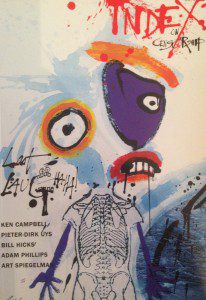
This article is from the November/December 2000 issue of Index on Censorship magazine and is part of a series of articles on satire from the Index on Censorship archives. Subscribe here, or buy a single issue. Every purchase helps fund Index on Censorship’s work around the world. For reproduction rights, please contact Index on Censorship directly, via [email protected]

